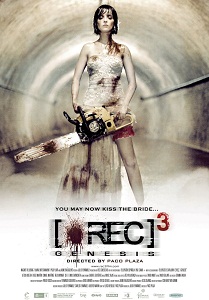When zombies first shuffled onto the screen in George Romero’s Night of the Living Dead, it was left unclear just how the dead came to rise again. Many theories were tossed about in that film and its sequels, among them a passing comet, biological weapons, and the coming of the apocalypse, but nothing ever really stuck. Within the past decade or so, faster, deadlier, more evolved brain eaters entered the pop culture spectrum, most notably in the Dawn of the Dead remake. However, as horror fans heralded a new breed of zombie, filmmakers were quick to distance their creations from Romero’s ghouls – Danny Boyle emerged as the biggest protester, insisting that the monsters in his film 28 Days Later were not zombies, but “infected.”
But what determines a zombie? Do their origins, speed, and motivations for killing really matter in the already vague scheme of things? Or do we simply know one when we see one?

Take Paco Plaza‘s [REC] 3: Genesis, the second sequel to the 2007 Spanish horror hit. The story follows Clara (Leticia Dolera) and Koldo (Diego Martín), a young couple preparing to take their vows before family and friends who are, of course, armed to the teeth with video cameras. Through shaky footage, we see their special day unfold like any other, complete with drunk, horny groomsmen, bad dancing, and flowing champagne. But the joyous celebration soon turns into the wedding from hell – literally – when demonic zombies crash their reception and make a meal of the guests. As the evil beings close in, it’s up to the newlyweds to find a way out before they’re next.
Whether or not they can agree that demonic possession qualifies a zombie, even the most scrutinizing cinephiles will appreciate the sophisticated style of [REC] 3. Whereas the first [REC] stayed loyal to serious, straight-forward scares, Genesis makes light of them. Fast-paced and giddily over-the-top, it delivers moments of twisted humor reminiscent of Sam Raimi and early Peter Jackson. Horror fans will be rewarded with plenty of knowing chuckles, especially when a chainsaw and small kitchen appliances come into play.

What’s most impressive about the third installment is the handling of the found footage theme. The brilliant choice of scenario provides a variety of devices and images, from the clarity of higher-grade digital cameras to the blurry product of smart phones. Despite the abundance of lenses, the film soon defies the questionable found footage tradition of recording in the face of danger by having the groom smash the only remaining handheld. Only then, well into the movie, does the title appear, signaling a farewell to a once innovative style and allowing traditional filmmaking to step in and tell the rest of the story.
In leaving behind a tired gimmick, [REC] 3: Genesis is able to move forward with a highly entertaining bloodbath inspired by some of the genre’s best elements. Zombie film or no zombie film, it’s still smart, funny, and, hopefully, a sign of better horror films to come.
[REC] 3: Genesis is now in limited release and on VOD.

